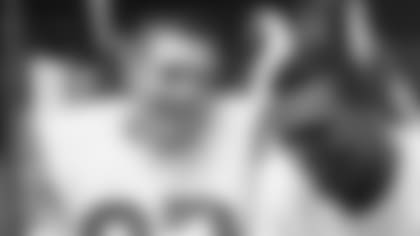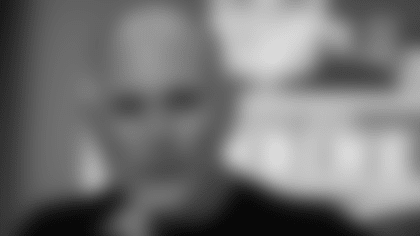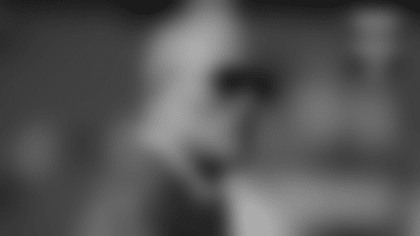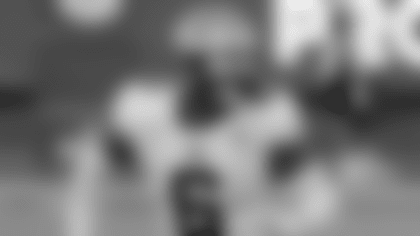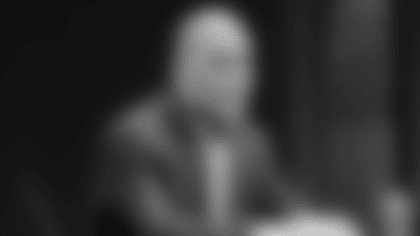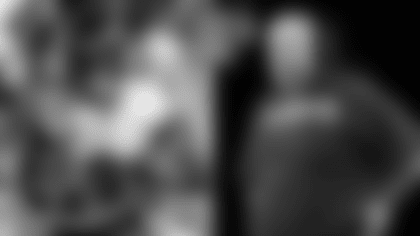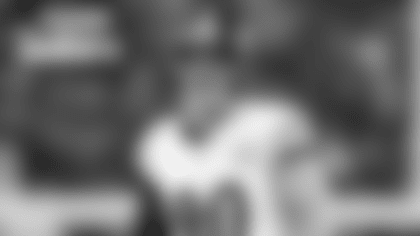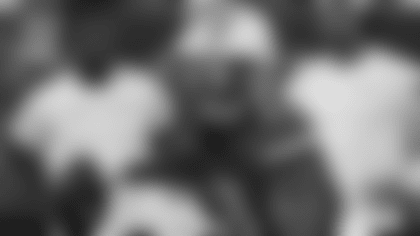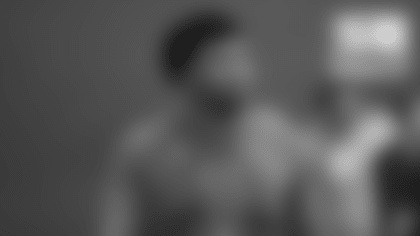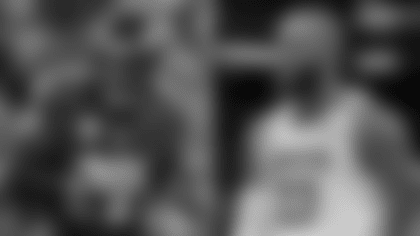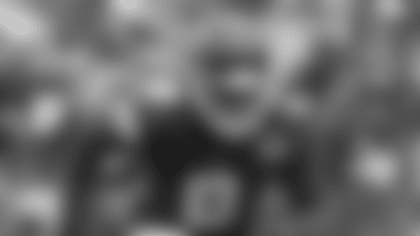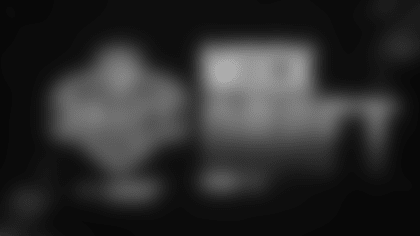*Each week leading up to a Ravens home game, a different Baltimore Football Alumni member checks-in with BaltimoreRavens.com. Be sure to continue to check back throughout the 2009 season to see what your favorite BFA members have been up to. ***View Past "Where Are They Now?" Features »**
Name: Raymond Berry
Team: Baltimore Colts
Position: Wide Receiver
Years Played in Baltimore: 1955 – 1967
After your playing career in Baltimore was complete, what did you do?
Coach Tom Landry of the Dallas Cowboys called me the spring after I announced my retirement, and he wanted me to join his staff in Dallas to be receiver coach. I hadn't really been thinking about coaching, and I had several conversations with Coach Landry and he changed my mind. We moved to Dallas and started into the coaching business.
How did you come to be the head coach of the New England Patriots?
I ended up with Coach Chuck Fairbanks there in the late '70s. He hired me to coach receivers with the Patriots, and that brought us to New England - we ended up staying there for thirteen years. I was on his staff and then Ron Erhardt's staff, and then I was out of coaching at one stretch for three to four years. Then, the Patriots offered me the head coaching job, and I was head coach there for six years.
What are you currently doing in life after football?
I'm still out there husslin'. I've got involvement with a company in the insurance/financial services field out of California, and I do quite a bit of work with them. And I am involved with a company out of Kansas in the air purification business, and I do some work with them. And I speak on a pretty steady basis, and I have a tremendous number of mail and phone calls. I'm not getting bored - I need a vacation.
Have you been back to the Baltimore area since you left following your playing career?
Yeah, I get there once, maybe twice, a year. Thanks to Steve Bisciotti [Baltimore Ravens Owner] we had a big 'round up' of the '58 Colt team that took place there last December. He invited everybody back and it was a real treat, but we're losing them [former Baltimore Colts] at a fast rate right now. The age range has gotten into the late 70's and early 80's and so the attrition rate is increasing all the time. This particular reunion, there were a lot of absences.
What do you miss most about playing football in Baltimore?
In having years to reflect on it, I don't know if you could ever recreate an environment and an atmosphere, and a combination of factors, that made it such a special experience. But you know, the relationship between the fans and the team is just a huge part of being in that period of time. I will definitely give the credit for a lot of that to Carroll Rosenbloom [Baltimore Colts Owner].
Carroll Rosenbloom was a great leader. He was a people person also, and he liked people. He reached out to people, and it was his basic philosophy to reach out to the fans of Baltimore. They organized the "Colt Corrals," and the players, they interacted with fans on a regular basis. Well, that comes right out of Carroll Rosenbloom's personality and his priorities. I think he just set the tone - leaders set the tone.
You mentioned the environment and atmosphere that was created in Baltimore. Obviously though, without the fans, none of that would be possible. Can you speak about the importance the fans?
Well I think that if you're not careful in pro football, you forget why it is that we have professional football – and the reason we have it is because of those fans. They turn on the television sets, and they buy the tickets.
When they stop turning on the TVs and buying the tickets, there ain't going to be no more NFL. NFL teams better never forget that because they're the one's that make this thing go, and to be able to acknowledge that and to treat them in the way they need to be treated is top priority.
Who was the best player you played with while in Baltimore?
John Unitas [Baltimore Colts Quarterback: 1956 - 1972] and Lenny Moore [Baltimore Colts Running Back: 1956 - 1967] were two of the most superior athletes I have ever been around. They just operated at a totally different level than all the rest of us, and they were just gifted.
Out of all of 631 catches you made throughout your career, which one sticks out most in your mind? Why?
Steve Sabol at NFL films was interviewing me about ten years ago, and he asked me, "Raymond, what was the greatest catch you ever made?" I hadn't really thought about it, and I looked at him and said "Steve, it really wasn't one, it was three." Because the first thing that came to my mind, without question, were the three most important catches I ever made in our two-minute drive to send that game [1958 World Championship game] into overtime up in New York against the Giants – because we were behind 17-14 with a minute and half left, backed up 80 something yards.
In that two minute drive, John [Unitas] hit me three plays in a row. We got the ball in field goal range, and the field goal team came running out there. [Steve] Myhra [Baltimore Colts Kicker: 1957 – 1961] kicked it, and we tied that game up. I didn't get it at the time, but without question, that's the high point of my entire pro career, those three catches.
Who did you choose to present you for enshrinement into the Hall of Fame, and why did you choose that person?
Weeb Eubank [Baltimore Colts Coach: 1954 – 1962] was my presenter, and the reason I choose him was because he choose me. When I came into football as a rookie out of Southern Methodist University, I came out of an era of football where you played both ways [offense and defense]. In my college career, I primarily was a defensive player, and I was a good defensive player. But you went both ways, and there were no fancy passing games in those days.
I had no preparation whatsoever to play professional football, and whenever I came to the Colts, I got to the right place at the right time because they had no veterans and I made the team the first year. But I didn't know my butt from first base about running pass routes or what pass defense was all about - it was just a maze to me.
I don't really know to this day why Weeb decided to go with me but he did, and he also picked up this Lithuanian free agent out of Pittsburgh named Unitas. It was two guys just trying to save our jobs, and that's how I got my foot into the NFL.
Do you have any advice for kids today who want to be professional football players?
I think it's a worthy goal. To have a dream is certainly part of being a young person - I certainly had one. I was eighteen years old when I saw my first professional player, and it was a movie made about Elroy "Crazy Legs" Hirsch. You got to remember that I grew up in an era with no television, so visually I never saw the great college players or the great pro players – didn't even know anything about pro football.
One of the basics of really getting to the top level of any profession is you're going to have to pay a price. You're going to have to be dedicated, you're going to have to work at it, you're going to have to pay attention to detail, you're going to have to learn how to dot the "i's" and cross the "t's," and you're going to have to start looking for every edge because when you get to a competitive level like the National Football League, careers come and go on inches. It takes discipline, it takes work ethic, and it's not going to be cheap. So for a young person to understand that early is being in touch with reality.
Do you have anything you would like to say to the fans who are reading this?
Thank you for your support! It is fifty years after I played, and I still run into 'satisfied customers.' I'll tell you, that's quite a treat.
When you sell a product, you like to make sure the costumer gets his monies worth. To have somebody fifty years later still be happy about what they bought, that gives you a good feeling.
The next Q&A will be Michael Jackson (Monday, December 7).


